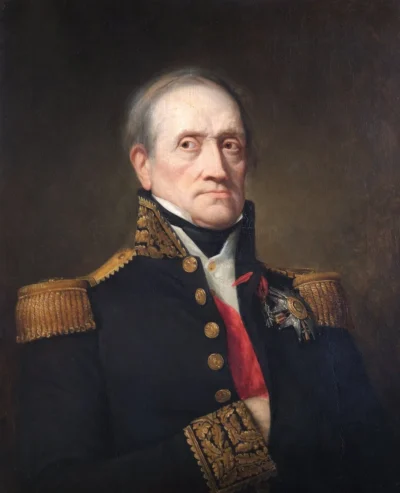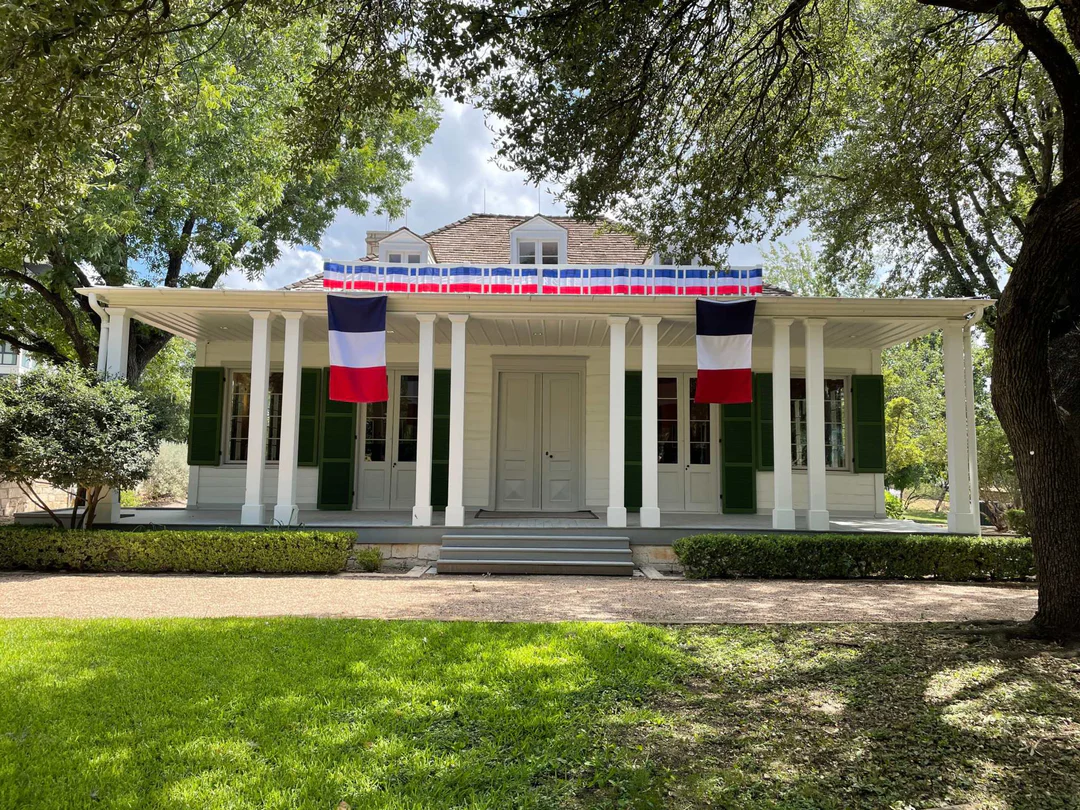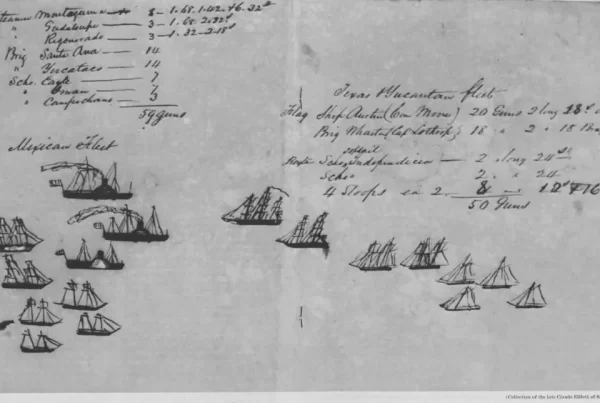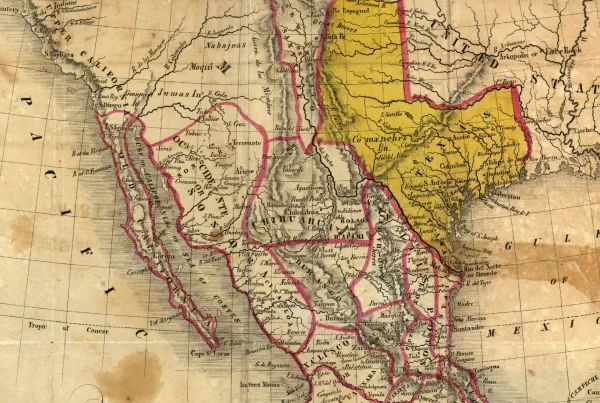After winning independence from Mexico in 1836, the Republic of Texas sought international recognition from the United States and European nations. Establishing formal diplomatic and trade relationships was vital for its survival as a new nation. France became the first European power to officially recognize Texas, offering a boost to its legitimacy on the world stage.
To solidify this relationship, Texas sent J. Pinckney Henderson as a diplomatic representative to Europe in 1837. After unsuccessful talks with Britain, Henderson negotiated directly with France.
France saw economic opportunity in Texas’s growing cotton trade and also aimed to counter British and American influence in the region. Additionally, France had recently gone to war with Mexico over unpaid debts and property damage claimed by French creditors and business owners—a three-month conflict later known as the “Pastry War.” Supporting Texas became another way for France to apply pressure on Mexico.
In September 1839, Henderson signed a treaty with the French government, represented by Jean-de-Dieu Soult, the President of the Council of Ministers. The Texas Senate ratified the treaty in early 1840. The Treaty of Amity, Navigation, and Commerce established peaceful relations, trade rights, and mutual protections for citizens of both nations. It addressed issues such as shipping rights, tariffs, consular authority, and neutrality during wartime.
Coming just months after France’s brief military conflict with Mexico—the Pastry War, which ended only because of British diplomatic pressure—the treaty also served as a warning to Mexico against attempting another invasion of Texas. Overall, it reflected Texas’s efforts to assert itself diplomatically and economically on the global stage.
This article is part of Texapedia’s curated primary source collection, which makes accessible both famous and forgotten historical records. Each source is presented with historical context and manuscript information. This collection is freely available for classroom use, research, and general public interest.
Treaty of Amity, Navigation and Commerce, between the Republic of Texas and His Majesty the King of the French
ARTICLE 1. There shall be perpetual peace and amity between His Majesty the King of the French,1 his heirs and successors, on the one part, and the Republic of Texas, on the other part; and between the citizens of the two states, without exception of persons or of places.
ARTICLE 2. The French and Texans shall enjoy, in their persons and property, in the entire extent of their respective territories, the same rights, privileges, and exemptions, which are or may be granted to the most favored nation. They shall have the right of disposing freely of their property by sale, exchange, by deed of gift, will, or in any other manner, without any impediment or difficulty. In like manner, the citizens may, on inheriting property in either of the states, may become its heirs, without any hindrance… They shall be exempted from all military service, — from all war contributions, — forced loans, — military requisitions, and in every other case, their personal or real estate shall not be subject to any other charge or impost than that which shall be paid by the citizens of the country themselves.

ARTICLE 3. If it should happen that one of the two contracting parties be at war with any other power whatever, the other power shall prohibit their citizens from taking or holding commissions or letters of marque2 to cruise against the other, or to molest the commerce or property of her citizens.
ARTICLE 4. The two contracting parties adopt in their mutual relations the principle “that the flag covers the goods.”3
If one of the two parties remains neutral when the other may be at war with a third power, the goods covered by the neutral flag shall also be considered to be neutral, even if they should belong to the enemies of the other contracting party.
It is equally understood, that the neutrality of flag protects also the freedom of persons, and that the individuals belonging to a hostile power, who may be found on board a neutral vessel, shall not be made prisoners, unless they are actually engaged in the service of the enemy…
ARTICLE 5. In case one of the contracting parties should be at war with another power, and her ships at sea should be compelled to exercise the right of search, it is agreed that if they meet a vessel belonging to the other, then neutral, party, they shall send their boat on board said vessel with two persons charged to enter on an examination of the nationality and cargo of said vessel. The commanders shall be responsible for all excess, acts of violence, which they may either commit or tolerate on such occasion. The search shall not be permitted but on board vessels which navigate without convoy…
ARTICLE 6. In case one of the two countries should be at war with a third power, the citizens of the other country, shall have a right to continue their commerce and their navigation with the same power, with the exception of the towns or ports, before which there shall be established an actual and effective blockade. It is fully understood, that this liberty of commerce and navigation, shall not extend to articles reputed contraband of war…
ARTICLE 8. The two contracting parties shall have the right to appoint consuls, vice-consuls, and consular agents in all the cities or ports open to the foreign commerce…
ARTICLE 9. The respective consuls, vice consuls, consular agents, and their chancelleries, shall enjoy in the two countries, the privileges which generally belong to their functions, such as… shall be granted in their places of residence, to the agents of the same rank of the most favored nation.4
ARTICLE 10. The archives, and in general all the papers of the offices of the respective consulates, shall be inviolable; and under no pretext, nor in any case, shall they either be seized or searched by the local authorities…
ARTICLE 12. The respective Consuls, Vice-Consuls, and Consular agents, shall be charged exclusively with the internal police of the commercial vessels of their nation; and the local authorities shall not interfere, except in cases of riot or disturbance of a nature calculated to affect the public peace, either on shore or on board other vessels.5
ARTICLE 13. The respective Consuls, Vice-Consuls and Consular agents, shall have the right to arrest all sailors who shall have deserted from the vessels of war or merchant vessels belonging to their respective countries, and may send them on board, or to their own country…
ARTICLE 14. French vessels arriving in or sailing out of the ports of Texas, and Texian vessels on their entry in or leaving the ports of France, shall not be subjected to other or higher duties… than those which are paid, or shall be paid by the vessels of the country itself.6

ARTICLE 15. The products of the soil, and of the industry of either of the two countries, imported directly into the ports of the other, the origin of which shall be duly ascertained, shall pay the same duties whether imported in French or Texian vessels. In like manner, the products exported will pay the same duties, and will enjoy the same privileges, allocations and drawbacks, which are or shall be allowed on the exportation of the same articles in the vessels of the country from which they are exported.
ARTICLE 16. The cottons of Texas, without distinction of quality, will pay on their entry into the ports of France, when they shall be imported directly in French or Texian vessels, a uniform duty of twenty francs on one hundred kilograms.7 All reduction of duties which may hereafter be made in favor of the cottons of the United States, shall be equally applied to those of Texas…
ARTICLE 17. From the day of the exchange of the ratifications of the present treaty, the duties at present levied in Texas on all fabrics and other articles of silk, or of which silk shall be a chief component part, imported directly into Texas, the manufacture of France, in French or Texian vessels, shall be reduced one half. It is clearly understood, that if the Texian government reduce the duties upon similar products of other nations, to a rate inferior to one half of the duties now existing, France cannot be obliged, in any case, to pay higher duties than those paid by the most favored nation. The duties at present levied in Texas on the Wines and Brandies of France, also imported directly in French or Texian vessels, shall be reduced, the first two-fifths, and the second one fifth.
It is understood, that in case the Republic of Texas should hereafter think proper to diminish the present duties on Wines and Brandies, the production of other countries, a corresponding reduction shall be made on the Wines and Brandies of France…
ARTICLE 18. The inhabitants of the French colonies, their property and ships, shall enjoy in Texas, and reciprocally the citizens of Texas, their property and ships shall enjoy in the French colonies, all the advantages which are or shall be granted to the most favored nation.
ARTICLE 19. The stipulations of the present treaty shall be perpetual, with the exception of the articles the fourteenth, fifteenth, sixteenth, seventeenth, and eighteenth, the duration of which is fixed to eight years, counting from the day of the exchange of the ratifications…
Done at Paris, the twenty-fifth day of September, in the year of our Lord, one thousand eight hundred and thirty-nine.
J. PINCKNEY HENDERSON
MARL. DUC DE DALMATIE
ADDITIONAL ARTICLES
ARTICLE 1. As the laws of France require, as conditions of the nationality of a vessel, — that she should have been built in France, — that the owner, the captain, and three-fourths of the crew, shall be citizens of France: and Texas, by reason of the particular circumstances in which she is placed, being unable to comply with the same conditions, the two contracting parties have agreed to consider as Texian vessels, those which shall be bona fide the exclusive and real property of a citizen or citizens of Texas, residents of the country for at least two years, and of which the captain and two-thirds of the crew, shall also be bona fide citizens of Texas.
ARTICLE 2. It is understood, that if the Republic of Texas thinks proper, hereafter, to diminish the duties now in force on silk goods, they will maintain between the silk goods the produce of countries beyond the Cape of Good Hope, and similar goods of other countries, a difference of ten per cent. in favor of the latter…
J. PINCKNEY HENDERSON
MARL. DUC DE DALMATIE
Manuscript and Source Information
The original manuscript of the treaty, as signed by J. Pinckney Henderson and Marshal Soult, was housed among the Republic of Texas Legation records and later transferred to the Texas Secretary of State archives. Related correspondence and diplomatic materials from this period are preserved in the Texas State Archives.
The published version of the treaty text is taken from H. P. N. Gammel’s The Laws of Texas, 1822–1897 (Vol. II, pp. 655–662), a widely used 10-volume compilation first printed in 1898. This edition remains one of the most accessible sources for original legislative and diplomatic documents from the Republic era.
On the French side, the treaty and supporting documents, including communications from Foreign Minister Marshal Soult, are preserved in the Archives Nationales in Paris. These materials form part of France’s official diplomatic records from the July Monarchy and include both the signed treaty and internal memoranda. While France never ratified the treaty, the surviving documents offer valuable insight into the motivations and diplomatic calculations of the French government.
Explanatory Notes
- This refers to King Louis-Philippe I, who ruled France from 1830 to 1848 during the July Monarchy. Unlike earlier kings styled “King of France,” Louis-Philippe adopted the title “King of the French” to signal that his authority came from the people, not divine right. His reign focused on expanding French economic influence abroad, including in North America. ↩︎
- Government-issued licenses authorizing private citizens (privateers) to attack enemy ships during wartime. This article prohibits issuing such licenses against each other’s commerce. ↩︎
- A key principle of neutral trade during wartime, meaning that goods on a neutral ship are protected by that ship’s national flag—even if the cargo belongs to an enemy. ↩︎
- Following this treaty, France established a permanent diplomatic presence in Texas. The French Legation was opened in Austin in 1841 and is now preserved as a historic site. Texas, by contrast, did not maintain a permanent legation in France. Instead, it relied on appointed ministers who worked on temporary diplomatic missions. ↩︎
- Refers to the authority of consuls over matters like crew discipline, contracts, or disputes on ships from their home country. ↩︎
- Import and export taxes placed on goods entering or leaving a country. ↩︎
- This sets a fixed import duty on Texas cotton entering France, roughly equal to about 20 francs per 220 pounds (100 kg). The clause ensures fair competition with U.S. cotton. ↩︎
Related Books
Dive deeper into this topic by purchasing any of these recommended books. As an Amazon Associate, Texapedia earns a commission from qualifying purchases. Earnings are used to support the ongoing work of maintaining and growing this encyclopedia.
- The Raven: A Biography of Sam Houston
- Lone Star Nation: The Epic Story of the Battle for Texas Independence
- Wars of the Mexican Gulf: The Breakaway Republics of Texas and Yucatan, US-Mexican War, and Limits of Empire 1835-1850
- Women and the Texas Revolution
- Texian Iliad: A Military History of the Texas Revolution, 1835-1836



